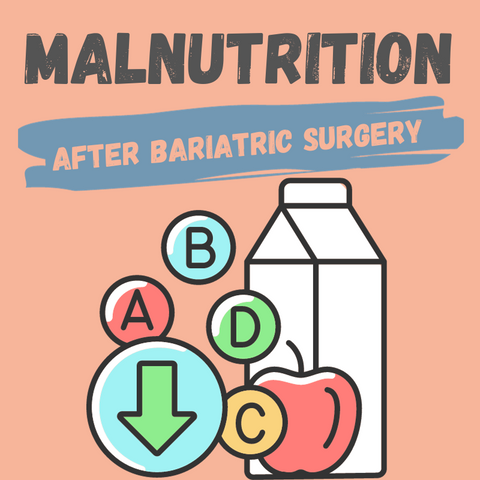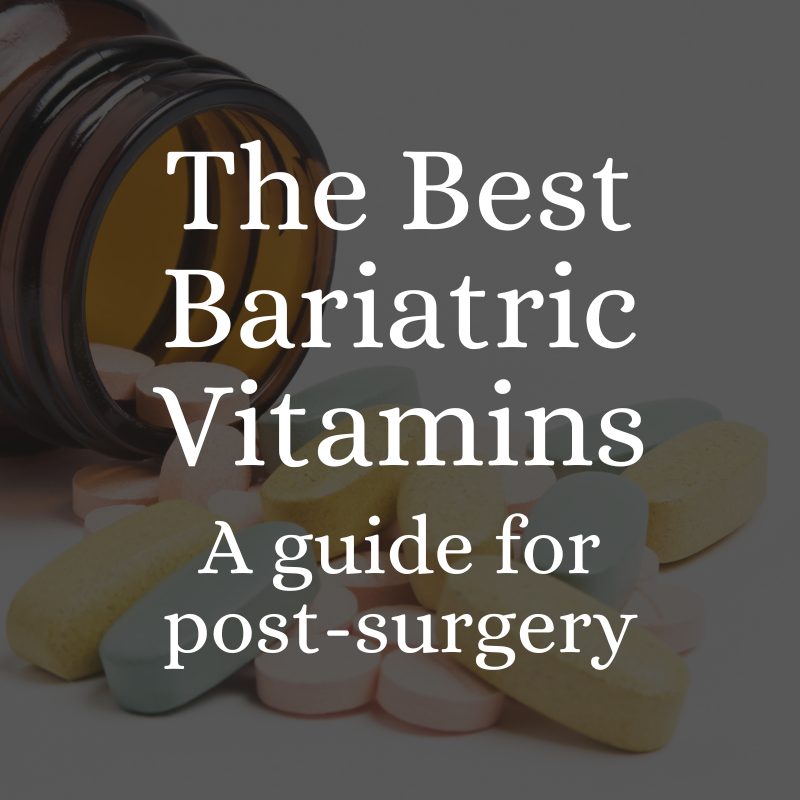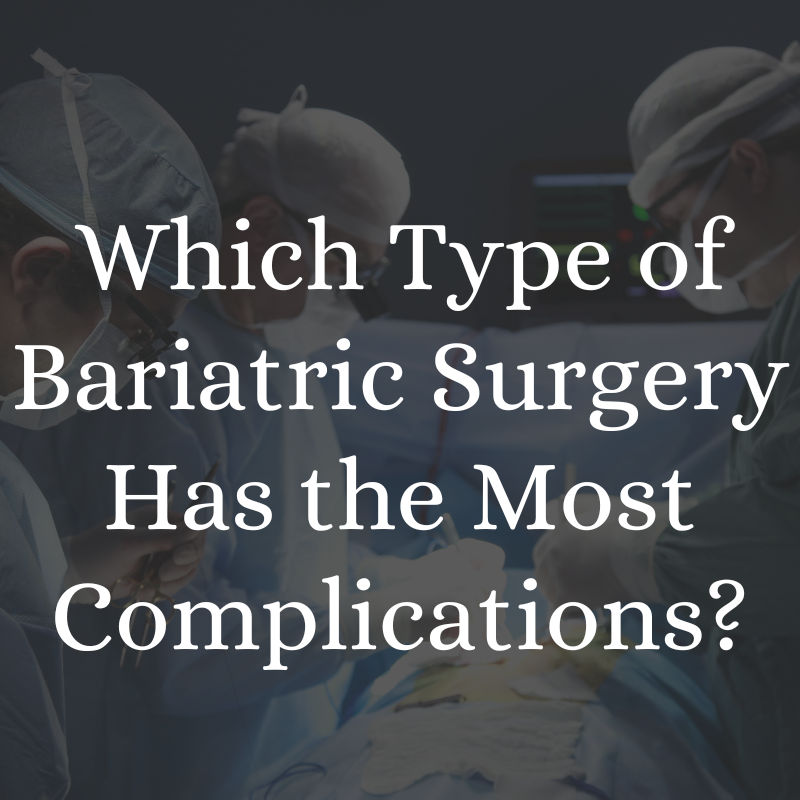Your cart is empty
Malnutrition: How To Avoid This Risk After Weight Loss Surgery

When all else fails, weight loss surgery offers an effective solution to chronic obesity and the numerous health problems associated with it. This surgery marks the beginning of a healthier and happier life. Commonly referred to as bariatric surgery, weight loss surgery permanently alters the body, providing long-term solutions.
While bariatric surgery can be highly effective in achieving weight loss goals, it also comes with the risk of malnutrition if not carefully managed. In this article, we will explore various strategies to mitigate this risk and ensure that individuals can fully enjoy the benefits of bariatric surgery without facing complications.
Understanding Bariatric Surgery
One of the most common forms of bariatric surgery is gastric bypass. This surgical procedure involves reducing the size of the stomach and rerouting the digestive tract by bypassing a portion of the small intestine. This significant alteration in digestion leads to substantial weight loss. However, it can also create challenges in nutrient absorption, potentially resulting in fatal malnutrition.
Gastric banding is another weight loss surgery, the procedure involving a band around the stomach to reduce its capacity. This surgery makes it equally harder to get adequate amounts of protein and vitamins.
Another bariatric surgery called gastric sleeve is the removal of a part of a stomach, to encourage weight loss.
All three of these weight loss surgeries can lead to malnutrition as a possible complication

Understanding Post-Op Malnutrition
Malnutrition is a condition where the body lacks sufficient nutrients to function, develop, and grow. Malnutrition refers to deficiencies in micronutrients as well as macronutrients.
Micronutrients include all the minerals and vitamins our body needs to produce hormones, enzymes, and various other substances. Macronutrients include proteins, fats, and carbohydrates. Our body heavily relies on macronutrients to produce energy.
Without these essential nutrients, the body will slowly start to fall apart and fail to function properly, and without timely intervention, the condition can turn life-threatening.
Studies have found that the most severe deficiency after bariatric procedures is that of protein.
After bariatric surgery, some patients find it difficult to tolerate protein-rich foods due to factors like smaller stomach size, changes in gut anatomy, and alterations in bilio-pancreatic function. These changes can hamper protein digestion and absorption.
The Prevalence of Malnutrition After Weight Loss Surgery
The prevalence of malnutrition following weight loss surgery is a well-recognized concern within the medical community. This life-threatening complication, although not immediate, can manifest months or even years after the surgical procedure.
Medical professionals are aware of this potential issue and take proactive measures to prevent it. As per the 2018 S3 Guideline released by the German Society for Metabolic & Bariatric Surgery, it is recommended that patients undergo a thorough nutritional assessment, including the measurement of micronutrients, both before and after undergoing bariatric surgery.
In most cases, malnutrition typically arises only when postoperative instructions are disregarded. However, in cases where malnutrition has already taken hold, swift action can still lead to improvement.
Identifying the Signs of Malnutrition
It's crucial for anyone undergoing bariatric surgery to have a thorough understanding of the warning signs indicating malnutrition.
As soon as you observe or suspect any of these signs, we strongly urge you to seek immediate medical attention. The earlier these deficiencies are detected, the more favorable the outcome.
- Following bariatric surgery, various factors such as stress, abrupt metabolic changes, vitamin and mineral deficiencies, low water intake, and reduced calorie consumption, can potentially lead to hair loss or brittle hair. Typically, this issue is temporary and primarily attributed to insufficient protein intake. However, if hair loss persists beyond a year and a half post-surgery, it is advisable to consult a healthcare professional and consider getting a blood test done to detect nutritional deficit.
- Lack of protein leads to muscle loss, lethargy, and fatigue. Protein deficiency also leads to a big appetite and getting sick quite often. Brittle hair and nails are also signs of protein deficiency.
- When the body isn’t getting enough vitamins, we experience fatigue, erratic heartbeat, weak muscles, dizziness, pale skin, unhealthy weight loss, shortness of breath, etc.
- In extreme cases of nutritional deficiencies, one might suffer from constipation, poor immune system, diarrhea, nausea, vomiting, muscle cramps, loss of appetite, etc.
Preventive Measures to Avoid Malnutrition after Weight Loss Surgery
Changing your diet, making behavioral changes, and being regular in your doctor’s visits is not just a routine post-op task; it's an exercise in the old maxim, 'prevention is better than cure’.
It’s pretty much expected to become deficient in nutrients after weight loss surgery, and it is also understood that it can be life-threatening. However, it can also be avoided by taking preventive measures.
Patients who have undergone bariatric surgery can maintain their health, achieve successful weight loss, and prevent malnutrition by ensuring they follow these steps.

Eat Well
- Follow your doctor's and nutritionist's guidance by consuming a nourishing diet that includes a variety of whole foods. This entails incorporating fruits, vegetables, and lean protein into your meals. Read More: The Top Bariatric Protein Shakes Available Online
- Steer clear of empty calories found in processed foods, sugary items, junk foods, and beverages. The potato chips and the juice pack might not seem too harmful, but they are packed with calories, carbohydrates, and sugars. If you can’t stop snacking, look for alternate, healthier snacks.
- Processed sugar can also trigger dumping syndrome, characterized by symptoms such as nausea, sweating, cramping, rapid heartbeat, and diarrhea. Not only is that uncomfortable, but these symptoms will also drain all the nutrients out of your body.
- While drinking an adequate amount of water may not directly prevent nutritional deficiencies, this zero-calorie beverage can reduce your overall calorie intake. Over time, it can also assist in replacing sodas and junk food with nutritious alternatives. If you’re not sure about your water intake after the surgery, just divide your weight in half. That is the amount of water you need to drink every day.
Never Miss a Doctor’s Appointment
A registered dietitian nutritionist will play a crucial role in your weight loss journey, working alongside your surgeon and doctors. If you're a bariatric patient, it's important to schedule consultations with them both before and after your surgery. They will closely monitor your nutritional requirements, and intake, and can detect malnutrition in its early stages.
Follow the Dietary Guidelines and Restrictions Post-Surgery
You’d also be prescribed several supplements by your doctor to prevent malnutrition. Take the daily recommended dose to avoid nutritional deficiencies and to regain your strength and health.
Ideally, you should be consuming vitamins B1 and B12, Folic Acid, Vitamin D, calcium copper, and zinc, either in the form of supplements or food:
The supplements will also enhance energy levels and contribute to an overall sense of well-being.
Make Behavioral Changes
Choosing to abstain from alcohol is not only important to making the surgery successful but also essential in preventing malnutrition. Alcohol is calorie-rich and offers no nutritional value.
It not only impedes your weight loss progress but can also contribute to nutritional deficiencies due to its carbohydrate content. Moreover, it can lead to neglect in taking your supplements and sticking to your dietary plan.
Frequently Asked Questions
Q) What is the Treatment of Malnutrition Following Bariatric Surgery?
The treatment of chronic malnutrition after bariatric surgery may involve the use of prescription-strength supplements, the incorporation of high-nutrient drink supplements into the diet, and, in severe cases, hospitalization and the administration of intravenous (IV) nutrition may be employed.
Q) Can Weight Loss Surgery Cause Malnutrition?
Weight loss surgery involves a high risk of malnutrition. It may also worsen existing nutritional deficiencies in patients with obesity who undergo this procedure. For this reason, it’s a common and required practice to conduct nutritional assessments before and after the surgery.
Q) What Are the Nutritional Guidelines For The Surgical Weight Loss Patient?
The nutritional guidelines for surgical weight loss patients include consuming 900 to 1200 calories per day, getting 60 to 80 grams of protein from sources like lean meat and low-fat milk, and maintaining a well-balanced diet daily.
Additionally, they should steer clear of carbonated drinks, alcohol, junk food, and processed foods, among other restrictions. Patients need to adhere to these guidelines and take any prescribed supplements as directed by their healthcare team.
Final Thoughts
The journey of weight loss isn’t just about losing pounds and looking slim and beautiful. It’s about embracing a healthier lifestyle that will allow you to enjoy your life to the fullest.
As we have learned, malnutrition is a common complication of bariatric surgery, but armed with doctors, research, good advice, and awareness, it can be diagnosed and treated in time.
By making good food choices, staying in tune with our bodies, and seeking guidance from healthcare experts, we're not only achieving our weight loss dreams but also safeguarding our well-being for years to come.
If you are looking for nutritionally balanced foods post-bariatric surgery check out our amazing bariatric food product range of mouthwatering and nutrition-filled protein bars, snacks, entrees, supplements, shakes, pudding, and many other types of meal replacements to help aid with your weight loss journey.
References:
https://www.verywellhealth.com/malnutrition-after-gastric-bypass-surgery-3156876
https://my.clevelandclinic.org/health/diseases/22987-malnutrition
https://www.credihealth.com/blog/signs-of-malnutrition-after-gastric-sleeve
https://www.credihealth.com/blog/signs-of-malnutrition-after-gastric-sleeve
https://www.ibihealthcare.com/bariatric/malnutrition-after-weight-loss/
https://turkeysleevegastrectomy.com/signs-of-malnutrition-after-gastric-sleeve/
https://bcofa.com/7-foods-to-avoid-after-weight-loss-surgery/
Writer: Joey Young Joey is a writer and researcher with a big passion for health. As a dad to five kids and three dogs, he knows first-hand the importance of a healthy lifestyle. His work is all about sharing useful health advice and insights with readers from all walks of life. |
Reviewed By: Dr. K. Huffman Dr. Kevin D. Huffman, D.O., is a board-certified bariatric physician with a distinguished reputation in obesity treatment. As the founder of American Bariatric Consultants, he has impacted over 10,000 patients and trained numerous healthcare providers. His protocols and training materials have made him a national leader in bariatric medicine. |
Bariatric Guides & Information
More Info
- Choosing a selection results in a full page refresh.



















